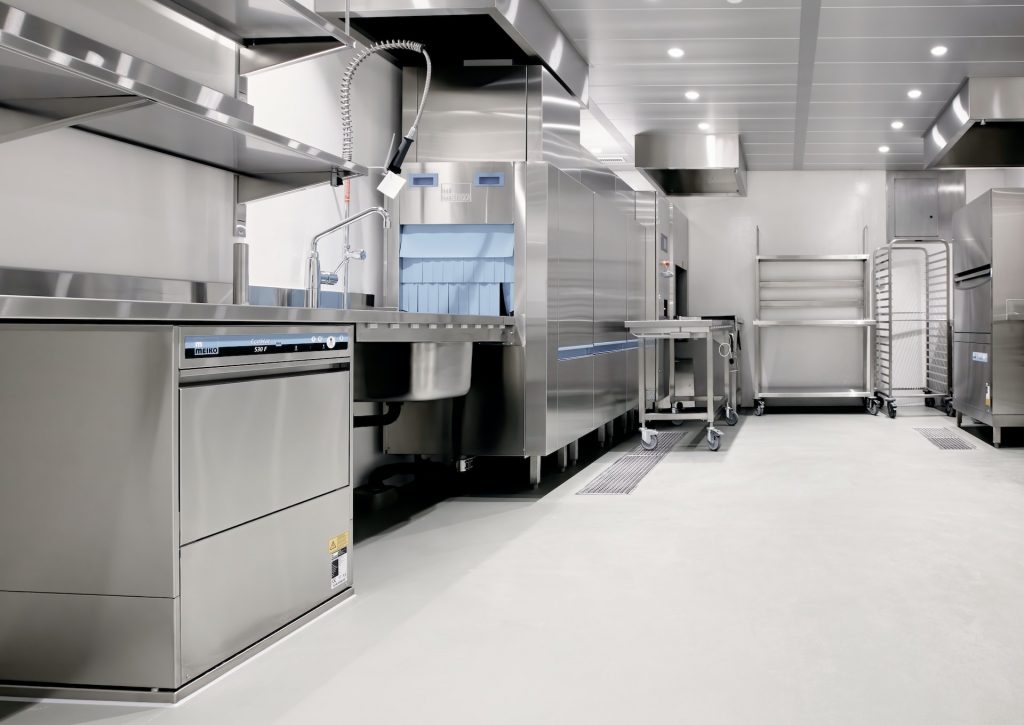Ensuring Food Safety Starts at the Ground Up:
In the intricate world of food processing, where even the smallest misstep can have significant consequences, maintaining a safe and sanitary environment is paramount. This journey towards food safety begins with the very foundation upon which everything rests – the floor. Traditional options like concrete and tile often fall short, harbouring bacteria, posing slip hazards, and deteriorating under the demands of the industry. That’s where resin flooring rises to the challenge, offering a unique combination of features that cater perfectly to the demanding needs of food processing plants.
Impenetrable Hygiene: Non-porous surfaces Thwart Bacteria Growth:
Unlike porous materials like concrete and tile, where microscopic crevices become breeding grounds for harmful bacteria, mould, and other pathogens, resin flooring creates a seamless, non-porous barrier. This eliminates hiding places for microorganisms, significantly reducing the risk of contamination and simplifying cleaning procedures. Studies have shown that resin floors can reduce bacterial growth by up to 99.9% compared to traditional options, ensuring a hygienically superior environment for food processing (National Centre for Biotechnology Information).
Safety First: Slip-Resistant and Durable for Optimal Protection:
Slippery floors are a significant safety hazard in the fast-paced and often wet environment of food processing plants. Resin flooring addresses this concern head-on with a variety of non-slip textures, even when wet. These textures meet stringent safety standards, including the National Floor Safety Institute’s (NFSI) High Traction Coefficient (HTC) requirements, minimising the risk of slips and fall that can lead to serious injuries (National Floor Safety Institute). Additionally, resin boasts incredible durability, withstanding heavy foot traffic, equipment movement, and constant wear and tear, ensuring long-lasting safety and performance.

Chemical Warfare: Unwavering Resistance to Cleaning Chemicals and Food By-products:
The rigorous sanitation practices in food processing facilities involve powerful cleaning chemicals, which can wreak havoc on traditional flooring materials. However, resin stands strong, impervious to acids, alkalis, and other harsh cleaning agents. This resilience extends to food by products that can quickly degrade concrete and other porous materials. Animal fats, blood, sugars, and even lactic acid from dairy processing pose no threat to resin’s integrity, ensuring your floors remain pristine and functional despite constant exposure (Master Builders Solutions).
Tailored Solutions: Customisable for Drainage and Chemical Resistance:
Food processing facilities aren’t one-size-fits-all environments. Different areas have specific needs, and resin flooring offers incredible flexibility to adapt. Floors can be sloped strategically to designated drains, ensuring liquids flow freely and don’t pool, creating potential sanitation issues. Additionally, specific chemical-resistant resins can be chosen for areas requiring extra protection against certain cleaning solutions or food products commonly used in your facility. This customised approach ensures optimal performance and longevity across your entire operation.
Investing in Long-Term Food Safety:
Choosing resin flooring for your food processing plant isn’t just about aesthetics; it’s a strategic investment in long-term food safety and operational efficiency. The benefits go beyond the surface, providing:
- Seamless, non-porous surfaces for maximum hygiene and easy cleaning
- Unmatched slip resistance for employee safety and reduced accident risk
- Durability that withstands heavy traffic, equipment, and wear and tear
- Resistance to harsh chemicals and food by products for lasting performance
- Customisation options for specific drainage and chemical needs
Ready to Upgrade Your Food Plant Floor?
Don’t settle for subpar flooring that compromises safety and hygiene. Contact us today to discuss your specific needs and discover how resin flooring can revolutionise your operation, ensuring a clean, safe, and productive environment where quality reigns supreme.

